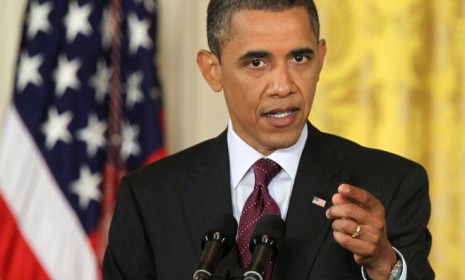Is the debt ceiling unconstitutional?
A broad reading of the 14th Amendment might allow Obama to bypass Congress and continue piling up debt — without caving to GOP demands

A free daily email with the biggest news stories of the day – and the best features from TheWeek.com
You are now subscribed
Your newsletter sign-up was successful
For weeks, the conventional wisdom in Washington has been that the federal government will default on its debt if the congressionally mandated limit on the nation's borrowing isn't raised by Aug. 2. But with Democrats and Republicans still struggling to reach a deal on hiking the debt ceiling, a new option is emerging: Democrats might simply declare that the debt ceiling is unconstitutional, scrapping the need for a deal at all. According to the 14th Amendment, "The validity of the public debt of the United States, authorized by law... shall not be questioned." That means the Obama administration can keep on racking up debt, even if Congress doesn't raise the debt ceiling, says Sen. Chris Coons (D-Del.). Could this new approach really work?
Absolutely: The language in the 14th Amendment is "extraordinary," says Garrett Epps at The Atlantic. Its wording is "unqualified and sweeping," which means that the Constitution places debt payments and the payment of already-appropriated funds "above the vagaries of congressional politics." If the Obama administration adopted this broad reading of the Constitution, using it in their political favor, it "would be bold"—but it wouldn't be wrong.
"Our national debt 'shall never be questioned,' the Constitution says"
The Week
Escape your echo chamber. Get the facts behind the news, plus analysis from multiple perspectives.

Sign up for The Week's Free Newsletters
From our morning news briefing to a weekly Good News Newsletter, get the best of The Week delivered directly to your inbox.
From our morning news briefing to a weekly Good News Newsletter, get the best of The Week delivered directly to your inbox.
Still, this is uncharted territory: "The 14th Amendment's Public Debt Clause has never been tested in court," says Ian Millhiser at ThinkProgress. And if the White House declared the "unspeakably stupid" notion of the debt ceiling unconstitutional, it's hard to know exactly how a court case would play out. Someone would have to sue, alleging that they've been personally injured "by the continued viability of the American economy." Furthermore, the Supreme Court has typically considered matters like this to be "political questions" that should not be resolved by judges. But with today's court, "it's anyone's guess."
"Senators float constitutional solution to debt ceiling"
And we shouldn't enter it: "Layering a constitutional crisis over political gridlock" would get the Obama administration its victory, says Ezra Klein at The Washington Post. "But it’ll fail terribly in terms of sustaining the market’s confidence in our political system." The danger behind failing to raise the debt limit has never been about whether our country can pay back its debts — we can, and the market knows that. Instead, it's the "brutal," "irresponsible" fight over the debt that would cause the market to "re-evaluate the faith" it has in our ability to make "sound economic decisions" in the future. A court case spotlighting our political system's inability to reach compromises on these economic issues would be "a step towards total breakdown."
"The debt ceiling might be unconstitutional, but now is not the time to find out"
A free daily email with the biggest news stories of the day – and the best features from TheWeek.com
-
 Alexei Navalny and Russia’s history of poisonings
Alexei Navalny and Russia’s history of poisoningsThe Explainer ‘Precise’ and ‘deniable’, the Kremlin’s use of poison to silence critics has become a ’geopolitical signature flourish’
-
 Are Hollywood ‘showmances’ losing their shine?
Are Hollywood ‘showmances’ losing their shine?In The Spotlight Teasing real-life romance between movie leads is an old Tinseltown publicity trick but modern audiences may have had enough
-
 A dreamy long weekend on the Amalfi Coast
A dreamy long weekend on the Amalfi CoastThe Week Recommends History, pasta, scenic views – this sun-drenched stretch of Italy’s southern coast has it all
-
 The billionaires’ wealth tax: a catastrophe for California?
The billionaires’ wealth tax: a catastrophe for California?Talking Point Peter Thiel and Larry Page preparing to change state residency
-
 Bari Weiss’ ‘60 Minutes’ scandal is about more than one report
Bari Weiss’ ‘60 Minutes’ scandal is about more than one reportIN THE SPOTLIGHT By blocking an approved segment on a controversial prison holding US deportees in El Salvador, the editor-in-chief of CBS News has become the main story
-
 Has Zohran Mamdani shown the Democrats how to win again?
Has Zohran Mamdani shown the Democrats how to win again?Today’s Big Question New York City mayoral election touted as victory for left-wing populists but moderate centrist wins elsewhere present more complex path for Democratic Party
-
 Millions turn out for anti-Trump ‘No Kings’ rallies
Millions turn out for anti-Trump ‘No Kings’ ralliesSpeed Read An estimated 7 million people participated, 2 million more than at the first ‘No Kings’ protest in June
-
 Ghislaine Maxwell: angling for a Trump pardon
Ghislaine Maxwell: angling for a Trump pardonTalking Point Convicted sex trafficker's testimony could shed new light on president's links to Jeffrey Epstein
-
 The last words and final moments of 40 presidents
The last words and final moments of 40 presidentsThe Explainer Some are eloquent quotes worthy of the holders of the highest office in the nation, and others... aren't
-
 The JFK files: the truth at last?
The JFK files: the truth at last?In The Spotlight More than 64,000 previously classified documents relating the 1963 assassination of John F. Kennedy have been released by the Trump administration
-
 'Seriously, not literally': how should the world take Donald Trump?
'Seriously, not literally': how should the world take Donald Trump?Today's big question White House rhetoric and reality look likely to become increasingly blurred